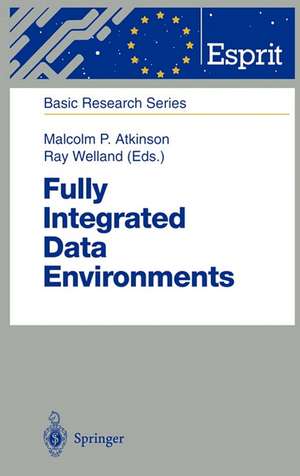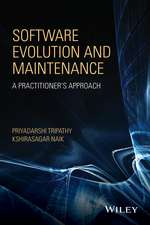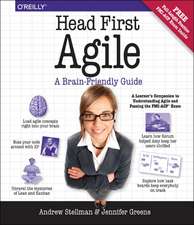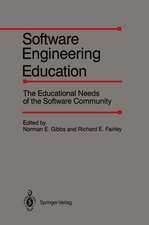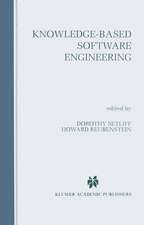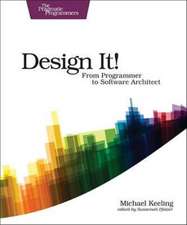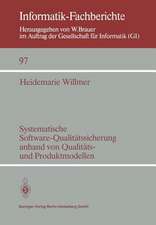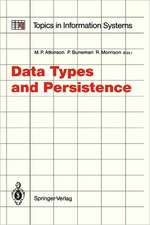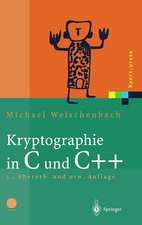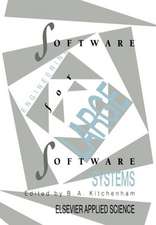Fully Integrated Data Environments: Persistent Programming Languages, Object Stores, and Programming Environments: ESPRIT Basic Research Series
Editat de Malcolm P. Atkinson, Ray Wellanden Limba Engleză Hardback – 30 noi 1999
| Toate formatele și edițiile | Preț | Express |
|---|---|---|
| Paperback (1) | 662.62 lei 6-8 săpt. | |
| Springer Berlin, Heidelberg – 6 oct 2011 | 662.62 lei 6-8 săpt. | |
| Hardback (1) | 664.59 lei 6-8 săpt. | |
| Springer Berlin, Heidelberg – 30 noi 1999 | 664.59 lei 6-8 săpt. |
Preț: 664.59 lei
Preț vechi: 830.74 lei
-20% Nou
Puncte Express: 997
Preț estimativ în valută:
127.19€ • 132.29$ • 104.100£
127.19€ • 132.29$ • 104.100£
Carte tipărită la comandă
Livrare economică 14-28 aprilie
Preluare comenzi: 021 569.72.76
Specificații
ISBN-13: 9783540657729
ISBN-10: 354065772X
Pagini: 646
Ilustrații: X, 629 p.
Dimensiuni: 155 x 235 x 40 mm
Greutate: 0.94 kg
Ediția:2000
Editura: Springer Berlin, Heidelberg
Colecția Springer
Seria ESPRIT Basic Research Series
Locul publicării:Berlin, Heidelberg, Germany
ISBN-10: 354065772X
Pagini: 646
Ilustrații: X, 629 p.
Dimensiuni: 155 x 235 x 40 mm
Greutate: 0.94 kg
Ediția:2000
Editura: Springer Berlin, Heidelberg
Colecția Springer
Seria ESPRIT Basic Research Series
Locul publicării:Berlin, Heidelberg, Germany
Public țintă
Professional/practitionerCuprins
1 Persistent Languages: Introduction and Overview.- 1.1 Language Design: Introduction and State of the Art.- 1.1.1 Higher-Order Persistent Polymorphic Programming in Tycoon.- 1.1.2 Fibonacci: A Programming Language for Object Databases.- 1.1.3 The Napier88 Persistent Programming Language and Environment.- 1.2 Linguistic Reflection: Introduction and State of the Art.- 1.2.1 Type-Safe Linguistic Reflection: A Generator Technology.- 1.2.2 Type-Safe Linguistic Run-time Reflection: A Practical Perspective.- 1.3 Type Systems: Introduction and State of the Art.- 1.3.1 A Calculus for Overloaded Functions with Subtyping.- 1.3.2 Protection in Persistent Object Systems.- 1.3.3 Subtyping and Assignment in Database Programming Languages.- 1.4 Bulk Types and Iterators: Introduction and State of the Art.- 1.4.1 The Joy of Sets.- 1.4.2 Bulk Types: Built-In or Add-On?.- 1.4.3 Extensible Objects for Database Evolution: Language Features and Implementation Issues.- 1.5 Concurrency and Transactions: Introduction and State of the Art.- 1.5.1 Specifying Flexible Concurrency Control Schemes: an Abstract Operational Approach.- 1.5.2 Persistent Threads.- 2 Persistent Support Systems: Introduction and Overview.- 2.1 Architecture and Abstract Machines: Introduction and State of the Art.- 2.1.1 Persistent Foundations for Scalable Multi-Paradigmal Systems.- 2.1.2 The DBPL Project: Advances in Modular Database Programming.- 2.1.3 The PamCase Machine.- 2.1.4 Tycoon: A Scalable and Interoperable Persistent System Environment.- 2.2 Object Store Design: Introduction and State of the Art.- 2.2.1 An Open System Architecture for a Persistent Object Store.- 2.2.2 Overview of PIOS: a Physically Independent Object Server.- 2.2.3 Efficient Incremental Garbage Collection for Client-Server Object Database Systems.- 2.2.4 Towards a Unified Model of Untyped Object Stores: Experience with the Tycoon Store Protocol.- 2.2.5 Measuring Persistent Object Systems.- 2.3 Implementation Techniques: Introduction and State of the Art.- 2.3.1 Concurrent Shadow Paging in the Flask Architecture.- 2.3.2 Locking in OODBMS Clients Supporting Nested Transactions.- 2.3.3 Query Processing in PIOS.- 2.3.4 Optimization of Nested Queries in Object Bases.- 2.3.5 Integrating Query and Program Optimization Using Persistent CPS Representations.- 2.3.6 An ad hoc Approach to the Implementation of Polymorphism.- 3 Using Persistent Languages: Introduction and Overview.- 3.1 Persistent Programming Environments: Introduction and State of the Art.- 3.1.1 Exploiting Persistent Linkage in Software Engineering Environments.- 3.1.2 Using Persistence Technology to Control Schema Evolution.- 3.1.3 Unifying Interaction with Persistent Data and Program.- 3.1.4 The Persistent Workshop: Programming Environment for Napier88.- 3.1.5 The Glasgow Persistent Libraries.- 3.1.6 Visualising Persistent Stores.- 3.2 Data Modelling: Introduction and State of the Art.- 3.2.1 Application Development using Data Modelling.- 3.2.2 The STYLE Workbench: Systematics of Typed Language Environments.- 3.2.3 Using Extensible Grammars for Data Modelling.- 3.3 Interoperability: Introduction and State of the Art.- 3.3.1 Querying the File.- 3.3.2 Updating the File.- 3.3.3 Lean Languages and Models: Towards an Interoperable Kernel for Persistent Object Systems.- List of Contributors.
Caracteristici
Research toward massively reducing the cost of building large, complex, sophisticated information systems Work brought together about 50 researchers from 7 European research groups and international collaborators Report on a major step in the campaign of research projects Authors synthesized consistent integrations of enabling technology and demonstrated beneficial results Includes supplementary material: sn.pub/extras
